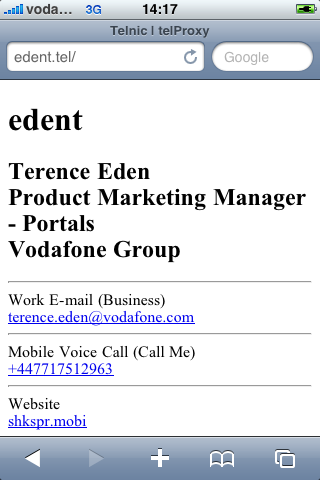What's the future for the .tel domain name?
Good news!
What is .tel
Your address book is probably a mausoleum - stuffed with the rotting corpses of long dead phone numbers. Perhaps you took my business card back in 2002, duly entered it on your Palm Pilot, and never spoke to me again. That address book entry has a phone number I've not used for a decade, an email address provided by a defunct start-up, and a postal address for a country I no longer live in.Isn't there a better way?
That's what .tel was supposed to be.
- I register a .tel domain -
http://edent.tel - I fill it with my contact details.
- You store my .tel in your address book.
- When I change my phone number, I update my .tel and your phonebook receives the changes.
dig @8.8.8.8 edent.tel naptr
dig +nocmd edent.tel any +multiline +noall +answer
This is what it looked like back in 2009:

Which, thankfully, had improved by 2013:

No further improvements were made.
So, how well did it work in practice?
Lack of critical mass
Back in 2012, there were 256k .tel domains. In 2016, it's a mere 105k domains. Those numbers need to be in the multi-millions in order to get the traction needed for success. In their original proposal, they were expecting 20 million registrations five years after launch.As registrations fell, so did income. Senior staff left the .tel organisation, and the infrastructure was left to rot. There were no updates, and it looked like .tel might collapse - an unprecedented event in DNS history.
I worked in the mobile industry for a decade. I don't think I ever met anyone else with a .tel. I got mine when they first launched in 2009 - and have been lonely ever since.
As far as I can tell, no mobile phones were ever released which had .tel capable address books.
Relaunch!
Late last year, .tel owners were sent emails describing the upcoming relaunch and reinvigoration of the service.✓ Lifting of usage restrictions.
✓ A new Telhosting platform.
✓ Android and iPhone apps.
✘ No porting of data!
✘ No sub-pages.
✘ No search.
✘ No advertising.
✘ Limited foreign language support.
It's a bit of a mixed bag. But, hopefully, there's enough to sustain numbers - if not increase them.
The most important is the lifting of hosting and design restrictions. Users will be able to point their .tel at any site they like. The idea of it just being an address book is disappearing.
For those people who do want to keep it as their virtual contact card - a new platform is being launched with an improved interface and fewer design restrictions. It will still be free of charge for domain owners.
As far as I can tell, this also means that sites can be secured with https - something which was unavailable on the old system.
Apps will be available for editing your site - but it would be a lot more useful to integrate with native address books.
It is downright odd that they're not automatically porting over peoples' data. There's going to be a one month grace period before launch in mid-March, but that isn't a huge amount of time.
The lack of sub-pages and search probably reflects how little those features were used. Removing Ad-Sense seems weird - but people can always add their own advertising.
They're also dropping support for "Arabic, Czech, Japanese, Korean, Portuguese and Russian" - I have no idea what those languages have in common! I assume they just mean that their hosting platform won't contain translations for those languages.
Is it enough?
I doubt it. Sorry to be so pessimistic - there are now literally hundreds of available top level domains. Including .mobi, .mobile, .phone, .call, .me - all of which could serve the same purpose.If .tel had built on their early momentum - and perhaps done some deals with mobile networks or manufacturers - then perhaps .tel would be in a better position.
It is pretty neat that they can store data like this in the DNS, and it is more discoverable than .hcard or other microformats - but I fear that the idea of placing one's address details in DNS is doomed to failure.
Because they aren't porting existing data to the new system, I expect that a lot of existing .tel sites are going to be empty.